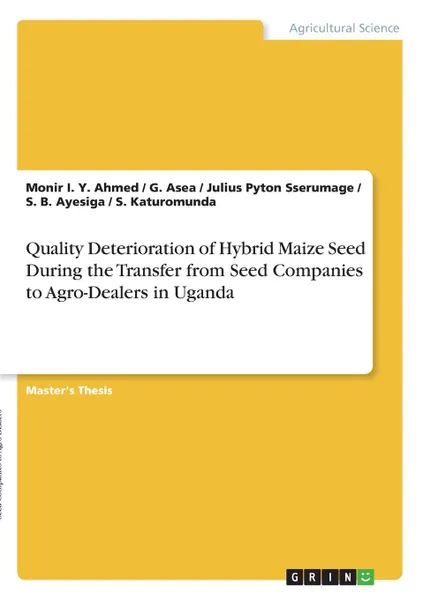Quality Deterioration of Hybrid Maize Seed During the Transfer from Seed Companies to Agro-Dealers in Uganda 12+
104 страницы
Категория: Индустрии
ISBN: 9783668571235
Язык: Английский
Где найти книгу?
📘 Master's Thesis from the year 2017 in the subject Agrarian Studies, Makerere University (Agricultural and environmental sciences), course: MSc. Plant Breeding and Seed Systems, language: English, abstract: Seed market is becoming global and globalization is growing very fast. To compete favourably in this new global seed world, quality and cost are and will certainly continue to be the key issues. The presence of counterfeit seed in Uganda seed market has been reported. Studies need to be conducted to investigate at which level along the seed value chain the deterioration in quality occurs.
The current study assessed the change in quality of hybrid maize seed as it is transferred from seed companies (when seed has been processed and packaged) to agro-dealers. Specific objectives of the study were to determine the levels of phenotypic and genotypic variation in hybrid maize seed from seed companies and agro-dealers. A total of 120 samples of four hybrid maize varieties (improved varieties most favored by farmers) used in this study were collected from agro-dealers in 15 districts and from 3 seed companies. Alpha lattice design with two replications has been used. Data was collected on 33 morphological traits and all the 120 samples were genotyped using 128 SNP markers.
The genetic distance analysis showed that agro-dealers' samples from Iganga, Masindi, Luwero, Soroti and Bukedea had high seed quality (genetically and phenotypically pure and similar to the seed companies' seed) for all the hybrids under the study, whereas samples from Lira, Hoima, Mubende, Mityana, Gulu, Kiboga and Bugiri had high rate of variation/contamination among the agro-dealer samples. In addition, the study showed that the further the agro-dealers are from the seed companies, the more contaminated the seeds are. Therefore, further studies should be conducted to investigate the causes of variation in seed quality between seed lots at the seed company level, and to verify the agro-dealers' b
The current study assessed the change in quality of hybrid maize seed as it is transferred from seed companies (when seed has been processed and packaged) to agro-dealers. Specific objectives of the study were to determine the levels of phenotypic and genotypic variation in hybrid maize seed from seed companies and agro-dealers. A total of 120 samples of four hybrid maize varieties (improved varieties most favored by farmers) used in this study were collected from agro-dealers in 15 districts and from 3 seed companies. Alpha lattice design with two replications has been used. Data was collected on 33 morphological traits and all the 120 samples were genotyped using 128 SNP markers.
The genetic distance analysis showed that agro-dealers' samples from Iganga, Masindi, Luwero, Soroti and Bukedea had high seed quality (genetically and phenotypically pure and similar to the seed companies' seed) for all the hybrids under the study, whereas samples from Lira, Hoima, Mubende, Mityana, Gulu, Kiboga and Bugiri had high rate of variation/contamination among the agro-dealer samples. In addition, the study showed that the further the agro-dealers are from the seed companies, the more contaminated the seeds are. Therefore, further studies should be conducted to investigate the causes of variation in seed quality between seed lots at the seed company level, and to verify the agro-dealers' b
Мнения
